
Robert Dennis Crumb is an American cartoonist who often signs his work R. Crumb. His work displays a nostalgia for American folk culture of the late 19th and early 20th centuries, and satire of contemporary American culture.
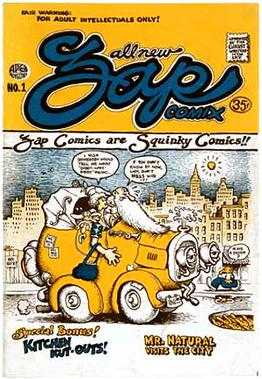
Underground comix are small press or self-published comic books that are often socially relevant or satirical in nature. They differ from mainstream comics in depicting content forbidden to mainstream publications by the Comics Code Authority, including explicit drug use, sexuality, and violence. They were most popular in the United States in the late 1960s and 1970s, and in the United Kingdom in the 1960s and 1970s.

Zap Comix is an underground comix series which was originally part of the counterculture of the late 1960s. While a few small-circulation self-published satirical comic books had been printed prior to this, Zap became the model for the "comix" movement that snowballed after its release. The title itself published 17 issues over a period of 46 years.
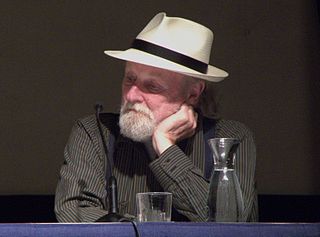
Gilbert Shelton is an American cartoonist and a key member of the underground comix movement. He is the creator of the iconic underground characters The Fabulous Furry Freak Brothers, Fat Freddy's Cat, and Wonder Wart-Hog.
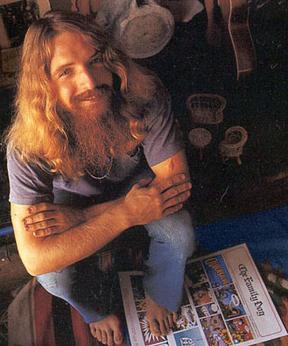
Richard Alden "Rick" Griffin was an American artist and one of the leading designers of psychedelic posters in the 1960s. He was a key figure in the underground comix movement as a fouding member of the Zap Comix collective. Griffin was closely identified with the Grateful Dead, designing some of their best-known posters and album covers including Aoxomoxoa. His work within the surfing subculture included both film posters and his comic strip, Murphy.
The Print Mint, Inc. was a major publisher and distributor of underground comix based in the San Francisco Bay Area during the genre's late 1960s-early 1970s heyday. Starting as a retailer of psychedelic posters, the Print Mint soon evolved into a publisher, printer, and distributor. It was "ground zero" for the psychedelic poster. The Print Mint was originally owned by poet Don Schenker and his wife Alice, who later partnered in the business with Bob and Peggy Rita.
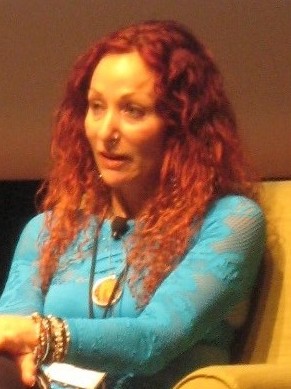
Aline Kominsky-Crumb was an American underground comics artist. Kominsky-Crumb's work, which is almost exclusively autobiographical, is known for its unvarnished, confessional nature. In 2016, ComicsAlliance listed Kominsky-Crumb as one of twelve women cartoonists deserving of lifetime achievement recognition. She was married to cartoonist Robert Crumb, with whom she frequently collaborated. Their daughter, Sophie Crumb, is also a cartoonist.

Last Gasp is a San Francisco–based book publisher with a lowbrow art and counterculture focus. Owned and operated by Ron Turner, for most of its existence Last Gasp was a publisher, distributor, and wholesaler of underground comix and books of all types.
Steve Clay Wilson was an American underground cartoonist and central figure in the underground comix movement. Wilson attracted attention from readers with aggressively violent and sexually explicit panoramas of lowlife denizens, often depicting the wild escapades of pirates and bikers. He was an early contributor to Zap Comix.

Victor Moscoso is a Spanish–American artist best known for producing psychedelic rock posters, advertisements, and underground comix in San Francisco during the 1960s and 1970s. He was the first of the rock poster artists of the 1960s era with formal academic training and experience. He was the first of the rock poster artists to use photographic collage in many of his posters.

Mr. Natural is a comic book character created and drawn by 1960s counterculture and underground comix artist Robert Crumb. First appearing in Yarrowstalks (1967), the character gained a following during the emergence of underground comix in the 1960s and 1970s, and has been extensively merchandised in various products.
A comic jam is a creative process where one or more comics artists collaborates on drawing or painting one single comic. Often the process is that one artist creates the first page, and then another artist creates the second, and a third does the next, and so on. There is no script that the artists work from, and the content of the comics is improvised. Any given artist working on a comic jam makes a page based solely on what happened on the previous page. Variations include each artist contributing a single panel, or set of two or three panels, and then passing it on to the next participant. The cartoonists of the seminal underground anthology Zap Comix were known for contributing a jam comic to each issue of Zap from around issue #3 onward.

Diane Robin Noomin was an American comics artist associated with the underground comics movement. She is best known for her character DiDi Glitz, who addresses transgressive social issues such as feminism, female masturbation, body image, and miscarriages.

Donald Richard Donahue was a comic book publisher, operating under the name Apex Novelties, one of the instigators of the underground comix movement in the 1960s.
Gary Edson Arlington was an American retailer, artist, editor, and publisher, who became a key figure in the underground comix movement of the 1960s and 1970s. As owner of one of America's first comic book stores, the San Francisco Comic Book Company, located in San Francisco's Mission District, Arlington's establishment became a focal point for the Bay Area's underground artists. He published comics under the name San Francisco Comic Book Company, as well as publishing and distributing comics under the name Eric Fromm. Cartoonist Robert Crumb has noted, "Gary made a cultural contribution in San Francisco in the late 1960s, through the '70s, '80s & '90s that was more significant than he realizes."

Young Lust is an underground comix anthology that was published sporadically from 1970 to 1993. The title, which parodied 1950s romance comics such as Young Love, was noted for its explicit depictions of sex. Unlike many other sex-fueled underground comix, Young Lust was generally not perceived as misogynistic. Founding editors Bill Griffith and Jay Kinney gradually morphed the title into a satire of societal mores. According to Kinney, Young Lust "became one of the top three best-selling underground comix, along with Zap Comix and The Fabulous Furry Freak Brothers".

Company & Sons was an early underground comix publisher based in San Francisco, ran by John Bagley. The company operated from 1970 to 1973, publishing a total of 15 titles, all but one of them consisting of a single issue.

San Francisco Comic Book was an underground comix anthology published between 1970 and 1983. Conceived of and edited by Gary Arlington, the anthology highlighted the work of many of San Francisco's top underground talents, including Bill Griffith, Robert Crumb, Kim Deitch, Justin Green, Rory Hayes, Willy Murphy, Jim Osborne, Trina Robbins, and Spain Rodriguez.
Keith Green was an American publisher, distributor, and art dealer. Starting out in the late 1960s as an underground comix distributor, in the early 1970s, he published comics, and by the mid-1970s he had become a New York City art dealer. He was the younger brother of cartoonist Justin Green.
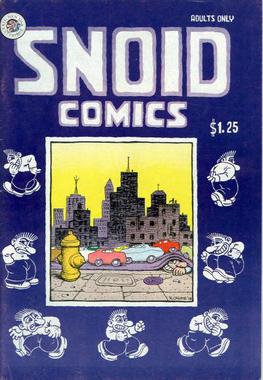
The Snoid, occasionally referred to as Mr. Snoid, is an American underground comix character created by Robert Crumb in the mid-1960s. A diminutive sex fiend and irritating presence, the Snoid often appears with other Crumb characters, particularly Angelfood McSpade, Mr. Natural, and Crumb's own self-caricature.














